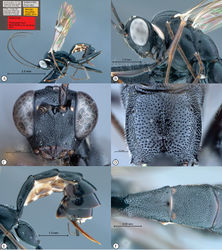Cryptopimpla onyxi
| Notice: | This page is derived from the original publication listed below, whose author(s) should always be credited. Further contributors may edit and improve the content of this page and, consequently, need to be credited as well (see page history). Any assessment of factual correctness requires a careful review of the original article as well as of subsequent contributions.
If you are uncertain whether your planned contribution is correct or not, we suggest that you use the associated discussion page instead of editing the page directly. This page should be cited as follows (rationale):
Citation formats to copy and paste
BibTeX: @article{Berry2016ZooKeys, RIS/ Endnote: TY - JOUR Wikipedia/ Citizendium: <ref name="Berry2016ZooKeys">{{Citation See also the citation download page at the journal. |
Ordo: Hymenoptera
Familia: Ichneumonidae
Genus: Cryptopimpla
Name
Cryptopimpla onyxi Reynolds Berry & van Noort sp. n. – Wikispecies link – ZooBank link – Pensoft Profile
Material examined
HOLOTYPE ♀: South Africa, Western Cape, Walker Bay Nature Reserve, 34°27.414'S, 19°21.393'E, 57m, 14 May –14 June 1997, S. van Noort, WB97-M01, Malaise trap, South coast Strandveld, SAM-HYM-P047460 (SAMC). Paratypes 7♂: South Africa, Western Cape, Walker Bay Nature Reserve, 34°27.414'S, 19°21.393'E, 57m, 6 September – 4 October 1997, S. van Noort, WB97-M09, Malaise trap, South coast Strandveld, SAM-HYM-P044545, SAM-HYM-P047478, SAM-HYM-P047479, SAM-HYM-P047481 (SAMC, BMNH); ♂: South Africa, Western Cape, Walker Bay Nature Reserve, 34°27.414'S, 19°21.393'E, 57m, 18 Apr – 16 May 1998, S. van Noort, WB97-M30, Malaise trap, South coast Strandveld, SAM-HYM-P048105 (SAMC); ♂: South Africa, Western Cape, Kogelberg Nature Reserve, 34°16.481'S, 19°01.033'E, 16 Mar – 16 Apr 1999, S. van Noort, KO98-M17, Malaise trap, Mesic Mountain Fynbos last burnt c. 1988, SAM-HYM-P47482 (SAMC).
Description
Body subpolished. Body black. Pronotal collar white.
Head. Densely punctate. Frons unarmed. Clypeus profile weakly convex with a curved lip on the ventral margin. Clypeus edge convex. Upper tooth of mandible longer than the lower tooth. Setae on head and clypeus short and sparse. Flagellum tapered to a slender apex. Tentorial pits small or indistinct. Eye in lateral view 0.7–0.72 times as long as wide, maximum width in anterior view 0.4–0.56 times shortest inter-ocular distance.
Mesosoma. Mesosocutum moderately punctate. Scuto-scutellar groove broad with deep lateral indentations. Epicnemial carinae present ventrally and dorsally, dorsally converging toward anterior edge of mesopleuron. Propodeum with carination reduced to medial area or absent, its anterior margin with a blunt median projection. Wings hyaline. Fore wing with two bullae closely situated appearing as one; vein 2m-cu sinuate; areolet truncate-shaped. Hind wing with one or two basal hamuli and six to seven distal hamuli.
Metasoma. Tergum 1 punctate with dorsolateral carinae substituted with longitudinal wrinkles, posterior margin weakly convex; second tergum 1.09–1.25 times longer than wide, spiracle situated at basal 0.25–0.26 of tergum (measured in lateral view), gastrocoeli elongate; terga 4–8 moderately compressed in females, no dorsolateral compression in males; female metasomal tergum 5 as wide as tergum 6; hypopygium strongly sclerotized. Ovipositor weakly upcurved; sheath striations present.
CT 1.6–1.8; ML 0.9–0.96; IO 2.1; OO 1.9; Fl1 4.2; OT 0.5 (SAM-HYM-P047460); body length 6–8.4 mm; antenna length 8.1–9.0 mm; fore wing length 6.1–6.8 mm.
Differential diagnosis
Cryptopimpla onyxi is immediately distinguishable from all other Afrotropical Cryptopimpla species by having a unique colour combination of a black body and a white pronotal collar. The clypeus is 1.6–1.8 times broader than high, distinguishing Cryptopimpla onyxi from all other species in the rubrithorax species-group where the clypeus is more than 1.8 times broader than high. The scuto-scutellar groove in Cryptopimpla onyxi is broad with deep lateral indentations, distinguishing the species from closely-related species Cryptopimpla fernkloofensis, Cryptopimpla parslactis, Cryptopimpla hantami, and Cryptopimpla neili. The metasomal tergum 1 with dorsolateral carinae substituted with longitudinal wrinkles distinguishes the species from Cryptopimpla fernkloofensis and Cryptopimpla neili. Gastrocoeli on tergum 2 are elongate, separating Cryptopimpla onyxi from closely-related species Cryptopimpla fernkloofensis, Cryptopimpla elongatus, Cryptopimpla neili, and Cryptopimpla hantami.
Etymology. The species epithet refers to the black colouration of this species. Noun in apposition.
Distribution
Occurs in Strandveld and Mountain Fynbos vegetation types in South Africa (Western Cape).
Comments
The female metasomal tergum 5 as wide as tergum 6 separates the species from closely-related species Cryptopimpla hantami, Cryptopimpla zwarti, Cryptopimpla elongatus, and Cryptopimpla rubrithorax where tergum 5 is half as wide as high. However, no female specimens are available for Cryptopimpla fernkloofensis, Cryptopimpla parslactis, and Cryptopimpla neili. Thus, no comparisons could be made with those closely-related species.
Original Description
- Berry, T; van Noort, S; 2016: Review of Afrotropical Cryptopimpla Taschenberg (Hymenoptera, Ichneumonidae, Banchinae), with description of nine new species ZooKeys, (640): 103-137. doi
Images
|
